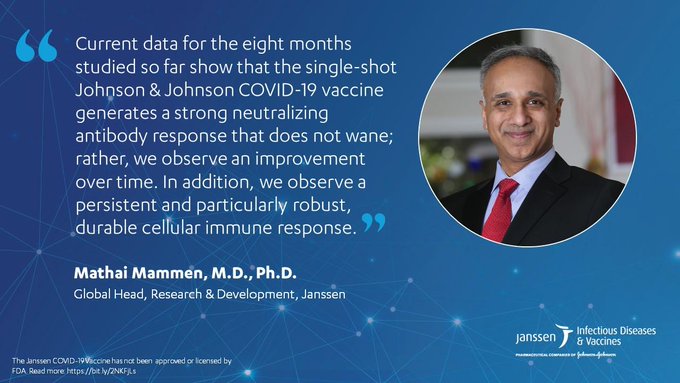Positive New Data for Johnson & Johnson Single-Shot COVID-19 Vaccine on Activity Against Delta Variant and Long-lasting Durability of Response
Demonstrated strong neutralizing antibody activity against the Delta (B.1.617.2) variant Persistent immune responses through at least eight months
New Delhi: Johnson & Johnson (NYSE: JNJ) (the Company) today announced data that demonstrated its single-shot COVID-19 vaccine generated strong, persistent activity against the rapidly spreading Delta variant and other highly prevalent SARS-CoV-2 viral variants. In addition, the data showed that the durability of the immune response lasted through at least eight months, the length of time evaluated to date. The two preprint study summaries have been submitted today to bioRxiv.
“Today’s newly announced studies reinforce the ability of the Johnson & Johnson COVID-19 vaccine to help protect the health of people globally,” said Paul Stoffels, M.D., Vice Chairman of the Executive Committee and Chief Scientific Officer at Johnson & Johnson. “We believe that our vaccine offers durable protection against COVID-19 and elicits neutralizing activity against the Delta variant. This adds to the robust body of clinical data supporting our single-shot vaccine’s ability to protect against multiple variants of concern.”
“Current data for the eight months studied so far show that the single-shot Johnson & Johnson COVID-19 vaccine generates a strong neutralizing antibody response that does not wane; rather, we observe an improvement over time. In addition, we observe a persistent and particularly robust, durable cellular immune response,” said Mathai Mammen, M.D., Ph.D., Global Head, Janssen Research & Development, Johnson & Johnson. “With each new dataset, we build on our solid foundation of evidence that our single-shot COVID-19 vaccine plays a critical role in ending the pandemic, which continues to evolve and pose new challenges to global health.”
Demonstrated strong neutralizing antibody activity against the Delta (B.1.617.2) variant
A preprint submitted by the Company today to bioRxiv contains a new analysis from blood samples obtained from a subset of participants (n=8) in the Phase 3 ENSEMBLE study. These data showed that the Johnson & Johnson single-shot COVID-19 vaccine elicited neutralizing antibody activity against the Delta variant at an even higher level than what was recently observed for the Beta (B.1.351) variant in South Africa where high efficacy against severe/critical disease was demonstrated.
In the ENSEMBLE trial, Johnson & Johnson’s single-dose COVID-19 vaccine was 85 percent effective against severe/critical disease and demonstrated protection against hospitalization and death. The vaccine was consistently effective across all regions studied globally, including in South Africa and Brazil, where there was a high prevalence of rapidly emerging Beta and Zeta (P.2) variants during the study period.
Immune responses persisted through at least eight months
Data submitted by Dan Barouch, M.D., Ph.D., of Beth Israel Deaconess Medical Center et al., to bioRxiv from a sub-study of the Johnson & Johnson Phase 1/2a COVID-19 vaccine study (n=20) showed that humoral and cellular immune responses generated by the Johnson & Johnson single-shot COVID-19 vaccine lasted through at least eight months, the latest timepoint recorded in the study thus far. Data showed that T-cell responses – including CD8+ T-cells that seek out and destroy infected cells – persisted over the eight-month timeframe examined.
A single dose of the Johnson & Johnson COVID-19 vaccine generated neutralizing antibodies against a range of SARS-CoV-2 variants of concern, which increased over time (the average neutralizing titer at eight months exceeded that average at 29 days), including against the increasingly prevalent and more transmissible Delta (B.1.617.2) variant, the partially neutralization-resistant Beta (B.1.351), the Gamma (P.1) variants and others, including the Alpha (B.1.1.7), Epsilon (B.1.429), Kappa (B.1.617.1) and D614G variants, as well as the original SARS-CoV-2 strain (WA1/2020).
Johnson & Johnson’s single-dose COVID-19 vaccine is now available in many regions and countries on a not-for-profit basis during the emergency pandemic period
The vaccine received Emergency Use Authorization (EUA) in the United States on February 27 and Conditional Marketing Authorization (CMA) by the European Commission on March 11, 2021. The World Health Organization (WHO) issued Emergency Use Listing on March 12, 2021 and the Company received an interim recommendation by the Strategic Advisory Group of Experts (SAGE) on Immunization for the WHO on March 17, 2021. Many more authorizations have been granted in countries worldwide, and regulatory submissions are ongoing.
Research and development activities for the Company’s COVID-19 vaccine, including the ENSEMBLE clinical trial and the delivery of doses for the U.S., have been funded in part with federal funds from the U.S. Department of Health and Human Services, Office of the Assistant Secretary for Preparedness and Response, Biomedical Advanced Research and Development Authority (BARDA), under Contract No. HHSO100201700018C, and in collaboration with the National Institute of Allergy and Infectious Diseases (NIAID), part of the National Institutes of Health (NIH) at the U.S. Department of Health and Human Services (HHS).
Johnson & Johnson has worked with BARDA since 2015 on innovative solutions for influenza, chemical, biological, radiation and nuclear threats and emerging infectious diseases such as Ebola.
Storage and Distribution
The Johnson & Johnson COVID-19 single-dose vaccine is compatible with standard vaccine storage and distribution channels with ease of delivery to remote areas. The vaccine is estimated to remain stable for two years at -4°F (-20°C), and a maximum of 4.5 months at routine refrigeration temperatures of 36° to 46°F (2° to 8°C). The Company will ship the vaccine using the same cold chain technologies it uses today to transport other medicines. The COVID-19 vaccine should not be re-frozen if distributed at temperatures of 36°F to 46°F (2°-8°C).

